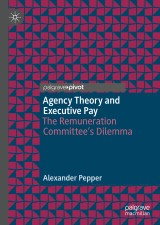Details

Agency Theory and Executive Pay
The Remuneration Committee's Dilemma|
58,84 € |
|
| Verlag: | Palgrave Pivot |
| Format: | |
| Veröffentl.: | 19.11.2018 |
| ISBN/EAN: | 9783319999692 |
| Sprache: | englisch |
Dieses eBook enthält ein Wasserzeichen.
Beschreibungen
<p></p><p>This new book examines the relationship between agency theory and executive pay. It argues that while Jensen and Meckling (1976) were right in their analysis of the agency problem in public corporations they were wrong about the proposed solutions. Drawing on ideas from economics, psychology, sociology and the philosophy of science, the author explains how standard agency theory has contributed to the problem of executive pay rather than solved it. The book explores why companies should be regarded as real entities not legal fictions, how executive pay in public corporations can be conceptualised as a collective action problem and how behavioral science can help in the design of optimal incentive arrangements. An insightful and revolutionary read for those researching corporate governance, HRM and organisation theory, this useful book offers potential solutions to some of the problems with executive pay and the standard model of agency. </p><p><br></p><p> </p><p></p>
<p>1. Agency Costs, Coordination Problems and the Remuneration Committee's Dilemma.- 2. What's Wrong with Agency Theory?.- 3. What a Public Corporation Really Is.- 4. Executive Pay as a Collective Action Problem.- 5. Behavioural Agency Theory.- 6. <i>The Modern Corporation's</i> Final Chapter.<br></p>
<p></p><p><b>Alexander Pepper</b> is Professor of Management Practice at the London School of Economics and Political Science, UK. He previously had a long career at PwC, where he was a global leader of PwC’s Human Resource Services consulting practice from 2002-2006. He has authored two books, <i>Senior Executive Reward </i>(2006), and <i>The Economic Psychology of Incentives</i> published by Palgrave Macmillan in 2015.</p><br><p></p>
<p></p><p>This new book examines the relationship between agency theory and executive pay. It argues that while Jensen and Meckling (1976) were right in their analysis of the agency problem in public corporations they were wrong about the proposed solutions. Drawing on ideas from economics, psychology, sociology and the philosophy of science, the author explains how standard agency theory has contributed to the problem of executive pay rather than solved it. The book explores why companies should be regarded as real entities not legal fictions, how executive pay in public corporations can be conceptualised as a collective action problem and how behavioural science can help in the design of optimal incentive arrangements. An insightful and revolutionary read for those researching corporate governance, HRM and organisation theory, this useful book offers potential solutions to some of the problems with executive pay and the standard model of agency.</p><p></p>
<p>Provides up to date examples and case studies to help illustrate the arguments</p><p>Describes the standard model of the firm before providing a critique of the three main premises on which the model is based</p><p>Describes a modified design-framework for executive pay plans based on recent developments in behavioural science</p>
Diese Produkte könnten Sie auch interessieren:

Länderrisikoprämien auf den Kapitalisierungszinssatz in der Unternehmensbewertung

von: Jan Eßer

16,99 €

Vergleichende Gegenüberstellung der Leasingbilanzierung nach HGB und IFRS

von: Karolin Ableitner

15,99 €














